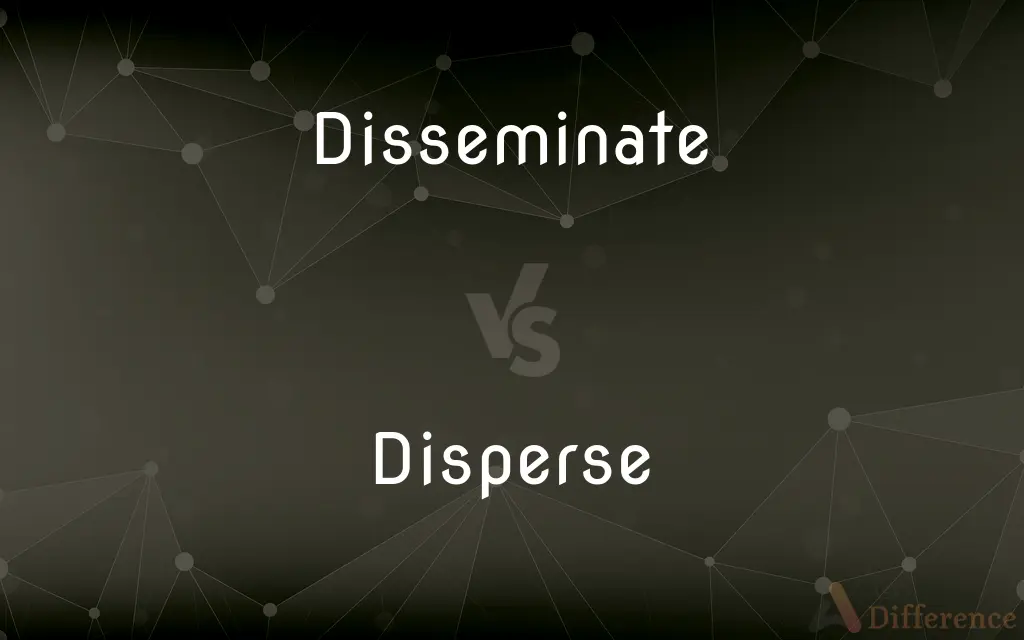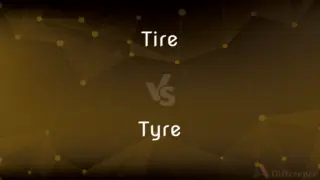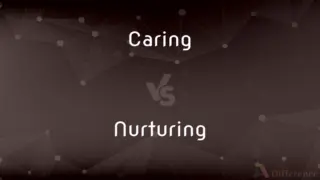Disseminate vs. Disperse — What's the Difference?
Edited by Tayyaba Rehman — By Fiza Rafique — Updated on April 26, 2024
Disseminate focuses on spreading information or knowledge widely, while disperse refers to scattering objects, people, or particles over an area.

Difference Between Disseminate and Disperse
Table of Contents
ADVERTISEMENT
Key Differences
Disseminate is primarily used when talking about the distribution of information or ideas to a broad audience or area, aiming for a wide reach and understanding. On the other hand, disperse often describes the physical scattering of things or individuals across a wide space, without the implication of information or knowledge sharing.
When you disseminate information, the intent is usually educational or informative, ensuring that the content is accessible to as many people as possible. Whereas, to disperse a crowd implies breaking it up and spreading out its individuals to reduce crowding or disband gatherings.
Dissemination can occur through various media such as publications, broadcasts, or digital platforms, focusing on the spread of knowledge. On the other hand, dispersion can happen naturally, like seeds dispersing from a plant, or be enforced, such as police dispersing a crowd.
The process of dissemination is often systematic and strategic, aimed at maximizing reach and impact. In contrast, dispersion might not follow a deliberate plan and can often be the result of environmental factors or immediate responses to situations.
Disseminate can also imply a level of permanence in the spread of information, as it becomes part of the collective knowledge. Disperse, however, suggests a more temporary or transient state, where objects or people eventually settle or regroup.
ADVERTISEMENT
Comparison Chart
Primary Use
Spreading information and ideas
Scattering objects, people, or particles
Intent
Educational, informative
Distributive, sometimes dispersive
Common Contexts
Media, education, communications
Environmental science, crowd control
Implication of Order
Systematic and strategic
Often random or natural
Outcome
Wider knowledge and understanding
Distribution or thinning of density
Compare with Definitions
Disseminate
The act of spreading information widely.
The organization aims to disseminate important health information.
Disperse
The act of scattering a group of people or animals.
The police were called to disperse the crowd.
Disseminate
Spreading knowledge or data across different sectors.
Scientists disseminate their research findings through journals.
Disperse
Breaking up and moving away in different directions.
The protesters dispersed quickly when it started to rain.
Disseminate
To distribute something so that it reaches many people.
They used social media to disseminate their message quickly.
Disperse
To spread widely into different directions.
The particles disperse into the atmosphere.
Disseminate
Broadcasting or announcing information to a broad audience.
The news channel disseminated the latest election results.
Disperse
To distribute or spread over a wide area.
The wind helped disperse the seeds across the field.
Disseminate
To make something widely known or available.
The internet has changed how we disseminate information.
Disperse
The process of vanishing or dissipating.
The smoke dispersed into the air gradually.
Disseminate
Spread (something, especially information) widely
Health authorities should foster good practice by disseminating information
Disperse
Disperse was a Christian rock band from Southern Indiana active from 1996 to 2004.
Disseminate
To scatter widely, as in sowing seed.
Disperse
To drive off or scatter in different directions
The police dispersed the crowd.
Disseminate
To spread abroad; promulgate
Disseminate news.
Disperse
To strew or distribute widely
The airplane dispersed the leaflets over the city.
Disseminate
To become diffused; spread.
Disperse
To cause to attenuate and disappear
The sun dispersed the fog.
Disseminate
(transitive) To sow and scatter principles, ideas, opinions, etc, or concrete things, for growth and propagation, like seeds.
Disperse
To separate (light) into spectral rays.
Disseminate
(intransitive) To become widespread.
The values of the human rights movement have disseminated throughout the world.
Disperse
To distribute (particles) evenly throughout a medium.
Disseminate
To spread around widely; to sow broadcast or as seed; to scatter for growth and propagation, like seed; to spread abroad; to diffuse; as, principles, ideas, opinions, and errors are disseminated when they are spread abroad for propagation.
Disperse
To separate and move in different directions; scatter
The crowd dispersed once the concert ended.
Disseminate
To spread or extend by dispersion.
A nearly uniform and constant fire or heat disseminated throughout the body of the earth.
Disperse
To attenuate and vanish; dissipate
The storm clouds had dispersed by noon.
Disseminate
Cause to become widely known;
Spread information
Circulate a rumor
Broadcast the news
Disperse
To scatter in different directions.
The Jews are dispersed among all nations.
Disperse
To break up and disappear; to dissipate.
Disperse
To disseminate.
Disperse
To separate rays of light, etc., according to wavelength; to refract.
Disperse
To distribute throughout.
Disperse
Scattered or spread out.
Disperse
To scatter abroad; to drive to different parts; to distribute; to diffuse; to spread; as, the Jews are dispersed among all nations.
The lips of the wise disperse knowledge.
Two lions, in the still, dark night,A herd of beeves disperse.
Disperse
To scatter, so as to cause to vanish; to dissipate; as, to disperse vapors.
Dispersed are the glories.
Disperse
To separate; to go or move into different parts; to vanish; as, the company dispersed at ten o'clock; the clouds disperse.
Disperse
To distribute wealth; to share one's abundance with others.
He hath dispersed, he hath given to the poor.
Disperse
Distribute loosely;
He scattered gun powder under the wagon
Disperse
To cause to separate and go in different directions;
She waved her hand and scattered the crowds
Disperse
Move away from each other;
The crowds dispersed
The children scattered in all directions when the teacher approached
Disperse
Cause to separate;
Break up kidney stones
Disperse particles
Disperse
Cause to become widely known;
Spread information
Circulate a rumor
Broadcast the news
Common Curiosities
How does disperse differ in its use from disseminate?
Disperse refers to the scattering of objects or individuals over an area, whereas disseminate focuses on spreading information or ideas.
What does it mean to disseminate information?
To disseminate information means to spread it widely among a large number of recipients.
What is a common context where disseminate is used?
Disseminate is commonly used in contexts involving education, media, and communication where information needs to be spread broadly.
Can animals disperse naturally?
Yes, animals can disperse naturally, often for reasons such as searching for food, escaping predators, or spreading their population.
Is disperse always a physical action?
Yes, disperse generally involves a physical action, whether it’s scattering particles, dispersing a crowd, or distributing items across an area.
Can the term disperse be used for information?
Typically, disperse is not used for information; it is more suited for describing the distribution of physical entities.
How do technologies aid in dissemination?
Technologies like the internet, broadcasting, and publishing facilitate the rapid and wide dissemination of information.
Why is disseminating information important?
Disseminating information is crucial for education, awareness, and ensuring that important content reaches a broad audience.
What effects does dispersing a crowd have?
Dispersing a crowd reduces density and can help in managing large gatherings for safety and order.
What is a metaphorical use of disperse?
Metaphorically, disperse can be used to describe the fading of intangible things like feelings or ideas, although it's less common.
Share Your Discovery

Previous Comparison
Tire vs. Tyre
Next Comparison
Caring vs. NurturingAuthor Spotlight
Written by
Fiza RafiqueFiza Rafique is a skilled content writer at AskDifference.com, where she meticulously refines and enhances written pieces. Drawing from her vast editorial expertise, Fiza ensures clarity, accuracy, and precision in every article. Passionate about language, she continually seeks to elevate the quality of content for readers worldwide.
Edited by
Tayyaba RehmanTayyaba Rehman is a distinguished writer, currently serving as a primary contributor to askdifference.com. As a researcher in semantics and etymology, Tayyaba's passion for the complexity of languages and their distinctions has found a perfect home on the platform. Tayyaba delves into the intricacies of language, distinguishing between commonly confused words and phrases, thereby providing clarity for readers worldwide.
















































